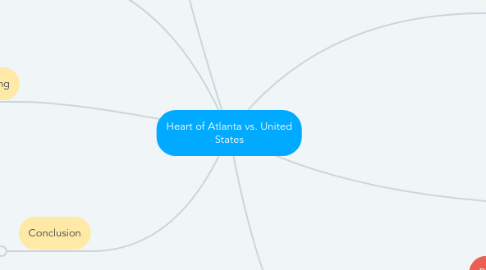
1. Conclusion
1.1. The Court agreed that Congress had the right to control interstate commerce in terms of race and believed that Congress had the authority to not only control interstate activities, but also had the ability to set standards on laws impacting the states, In this situation, it outlawed discriminatory practices by business
2. Other Cases Impacted by this ruling
2.1. Wickard v. Filburn
2.2. Polish National Alliance vs. NLRB
3. Importance
3.1. A business professional should care about this particular case because if a company causes harm, affects individual liberties, or infringes on the rights of the Constitution, the Government can and will step in to protect those rights.
4. Influence
4.1. Currently, the law nowadays protects against race, but also there is controversy in the LGBT community and whether they should be served. This ruling also had a major impact on laws such as affirmative action and being an Equal Opportunity Employer, which this law influenced
5. Issue:
5.1. Does Congress have the right to control businesses on terms of race due in part to the Commerce Clause?
6. Facts
6.1. Parties
6.1.1. United States Congress
6.1.2. Heart of Atlanta Motel
6.2. What Happened
6.2.1. The hotel had advertised in travel magazines to visit the hotel, but racially segregated against individuals who were not white.
6.3. Procedural History
6.3.1. Prior cases in the past have argued that the Commerce Clause of the Civil Rights Act of 1964 cannot regulate private businesses up until this point and that those businesses can choose which customers it wants to serve.
7. Rule of Law
7.1. Plantiff
7.1.1. Argued that Congress overstretched its boundaries by using the Commerce Clause as a way to control private businesses.
7.2. Defendant
7.2.1. Congress has to ability to control business that cross state boundaries and can impose rules on private businesses.
7.3. Court
7.3.1. The court agreed with the Defendant because most of the customers were out of state customers, the location of the hotel, and the marketing done to out of state customers. The court reinterpreted the law after prior attempts to use this argument were struck down in the past.
